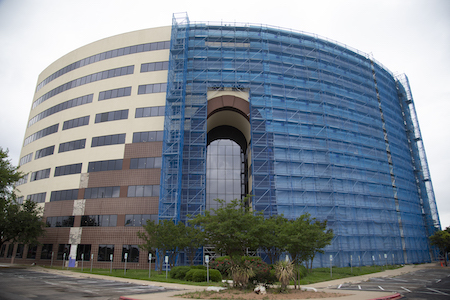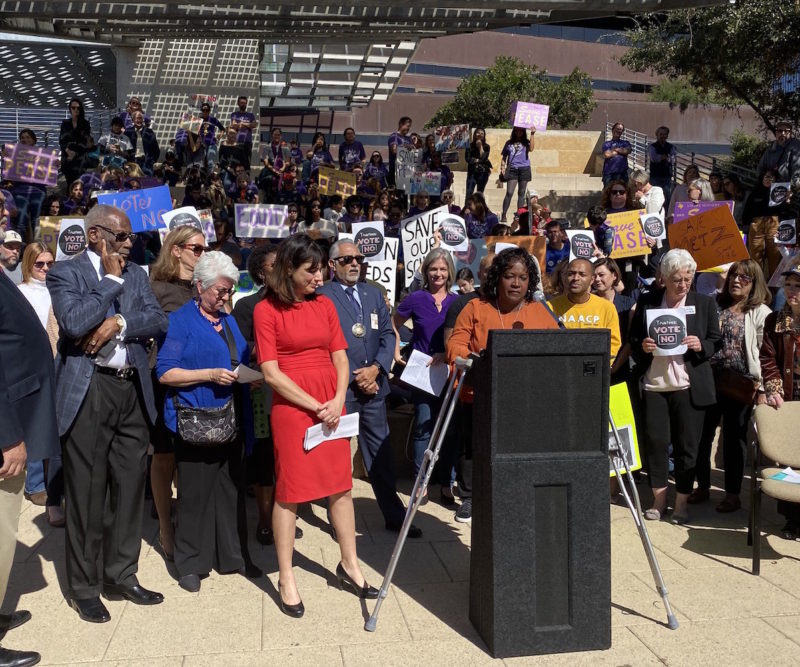By Daniel Van Oudenaren
Prior to a divided board vote to close four elementary schools, the Progressive political establishment that controls Austin local politics had looked like it was pretty united on education.
Austin Democrats control every school board seat, every city council seat, all but one county commissioners seat, all state legislative seats for the area, and the whole local judiciary.
And they could mostly all agree on a couple of broad-strokes narratives about education: Charter schools are bad, more funding will solve education woes (or at least go a long way toward doing so), Republicans are trying to destroy public education, teachers and staff need and deserve pay raises, etc.
Now those categories have all been upended. It’s a group of Democrats who are shuttering historic minority schools, claiming a lack of funding even as they build a nine-story administrative headquarters, hand out historic pay hikes, and ambitiously expand extracurricular programming and districtwide overhead.
In the meantime, a Republican-controlled legislature this year hiked statewide public education funding by the billions, a move that benefitted AISD to the tune of at least $46 million.
After the board vote on Nov. 19, 2019, hundreds of angry parents of Pease, Metz, Sims, and Brooke Elementary schools now find themselves uneasily aligned with the conservative dissenters who have increasingly felt unwelcome at AISD schools over the district’s leftward cultural drift and its embrace of a new sexual education curriculum that they say goes too far.

Many hundred more parents of the other elementary schools that were narrowly spared this year but could face closure in future years have also joined the fight. How this dynamic plays itself out in coming school board elections remains to be seen.
What is clear is that AISD’s closures process has not gone according to plan. When the district in September announced a list of 12 schools to be closed, it was initially easy enough for district leaders to poo-poo the grumblings that they heard out of community meetings with parents. With enough ‘explanation,’ dissenters eventually would come around. In the end, only a few diehards — easy enough to ignore — would remain opposed.
But parent advocates were persistent and organized, and they eventually found allies within the ranks of elected Democrats, including State Reps. Gina Hinojosa and Sheryl Cole, County Commissioners Brigid Shea and Jeffrey Travillion, Mayor Pro Tem Delia Garza, and others.
They were even able to enlist the help of a few quasi-national figures, including former news anchor Dan Rather and former President Johnson’s daughter, Lucy Baines Johnson.
Even the city’s largely Progressive media, which initially had parroted AISD talking points, eventually came around to covering the proposed closures more critically. In a recent editorial, The Statesman opposed all but two of the proposed closures.
Further complicating AISD’s plans, the district’s original rationale for the closures began to break down in late September and October as new enrollment data revealed a reversal of the district’s years-long enrollment decline. Nearly 700 new students were added this year.
Parent advocates also began to threaten to vote against a future bond package, which AISD would need approved in order to fund infrastructure at the newly consolidated schools, and they began to demand answers about how 2017 bond money had been used.
Suddenly parents were also feeling less generous about teacher and staff pay hikes; one parent last night suggested that AISD leaders should decline pay raises.
Eventually a rift appeared within the school board itself— the final vote was 6-3 — and even extended to the AISD staff, who could not keep a unified front. Chief Equity Officer Stephanie Hawley slammed the closures, saying, “The map you have of the closures is what 21st century racism looks like.”
Race, however, is not really the central question dividing the AISD community. Both sides have appealed to racial equity to justify their own position.
The real divisive question is one of modernity: What constitutes a modern school? What is a “21st century learning environment”?
AISD planners insist that the current system of neighborhood schools is inadequate to the needs of modern education. They have a vision instead to consolidate toward a network of fewer, larger, newer schools that would offer more services, programming, and longer hours.
District leaders also would like to branch out beyond education into a number of pet causes popular among the Progressive left. For example, under the original closures plan released in September, it was suggested that Maplewood Elementary would be repurposed for “affordable housing,” while under the new plan Pease Elementary will become a “social justice center.”
Given its proximity to the Capitol and City Hall, I would not be surprised if the Pease building ends up being used in part to house AISD lobbyists and ‘intergovernmental affairs’ professionals.
While many Austinites will probably agree that consolidated, modern schools would lead to efficiencies of scale and improve educational outcomes, it’s unclear whether the development of schools of this kind would align with the city’s environmental and city planning goals, or whether this vision is even economically feasible given resource constraints.
As pointed out last week by Mayor Pro Tem Delia Garza, the consolidations involved in AISD’s modernization plan run counter to the City’s vision to add more housing density and improve walkability. By making it harder for parents to get their children to and from school and after-school activities, AISD could make traffic congestion worse while leaving school deserts in parts of the city just as new housing supply finally comes on the market.
Many AISD parents say what’s important to them isn’t having a ‘modern’ school, it’s having a ‘local’ or ‘community’ school. That’s what a number of them have told me, and that’s what many have said at community meetings and school board meetings. They want to be part of their children’s lives and education, and it’s easier to do so if schools are closer to work or home.
With last night’s vote, AISD trustees made clear that they hadn’t heard that message. The vote signals that in Austin, the Progressive consensus on education is broken. Fundamental questions — what constitutes a good school? what should we be teaching our children? — are back on the table, back up for debate.
Photo Credit: Protesters at City Hall, Nov. 19, 2019 (Rep. Gina Hinojosa / Twitter)
